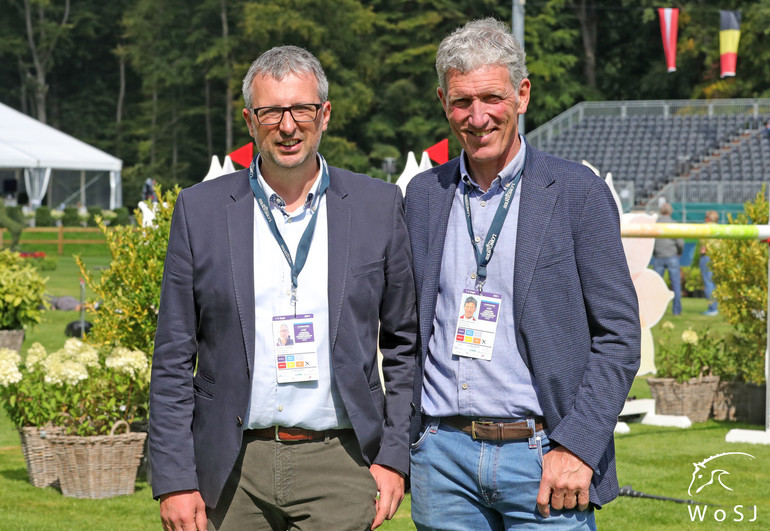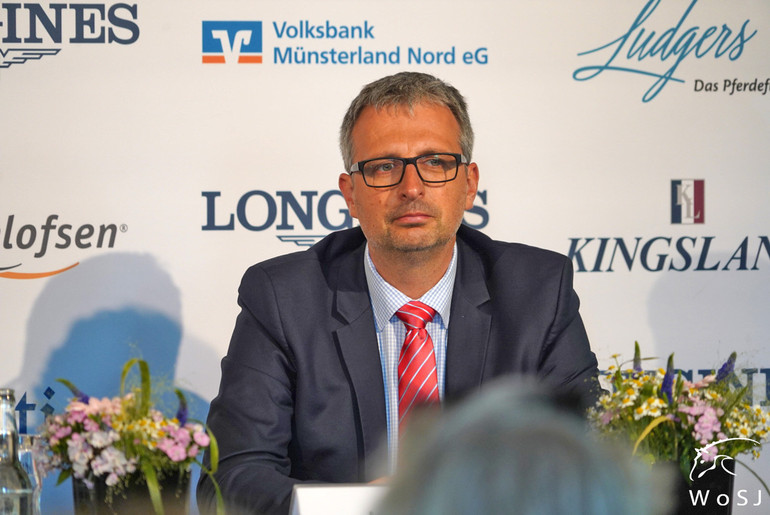Text © World of Showjumping
From sport science studies and a casual visit to see Ludger Beerbaum’s new indoor project to being the event director at the Longines FEI Jumping European Championship 2021, Karsten Lütteken had no idea what he was getting into when he first visited Riesenbeck International in 2014. To World of Showjumping, Lütteken tells about his unusual career path, how Riesenbeck International evolved from a training base to hosting a major championship and how it felt behind the scenes at the 2021 Europeans – an event that prior, during and after, has been praised by many.
Since the end of 2014, Lütteken has been in charge of running Riesenbeck International, but when he first met Beerbaum – over twenty years ago – it was in a whole different setting. At the end of his sport science studies at the University of Cologne, Lütteken focused on the training of horses and compared it to the athletic training of human athletes. “We focused on stamina and strength – factors that at the time perhaps were not so close to the way that equestrians approached the training of their horses. It seemed equestrians wanted control; they wanted the horses to jump better, but often neglected the fundamentals of athletic training. We thought it was time to focus on this. Through this project in 2001, I got my first contact to Ludger.”
I was supposed to be in Riesenbeck for a week, to plan the grand opening – and here we are, seven years later
Ahead of the 2004 Olympic Games in Athens, Lütteken and Beerbaum started to work together in Riesenbeck, doing heart rate measurements and other tests on the condition of the horses. “Ludger was in a position where he could ride either Gladdys or Goldfever at the Games – but Gladdys had issues with lack of condition and stamina. I was with them at the Sunshine Tour in 2004 and made a special training with her there. Our co-operation went on until the Beijing Olympics, where the climate was a challenge.”
After these projects were finished, the contact between the two lessened but never died. “We still spoke, and then there was a phone call at the end of 2014, where I asked if there was anything new going on in Riesenbeck,” Lütteken recalls. “And Ludger said ‘Yes, I will build a new indoor’ – and he invited me to have a look. From this point on, we were in closer contact again. At the end of 2014, I was asked to be in Riesenbeck and help Ludger start up the venue. I was supposed to be in Riesenbeck for a week in January, to plan the grand opening – and here we are, seven years later.”
Building an international venue for big shows was not the original intention
A lot has changed since Lütteken’s first visit to Riesenbeck International. “From the beginning, we did not have a clear structure on how to run this place,” he explains. “The first idea was to create the best training situation for the Beerbaum-riders, and only if there would be space to run a small show, that would be fine. Building an international venue for big shows was not the original intention,” he smiles. “Step by step, things developed: We went from having a few training shows to more and more events, and soon we needed more staff. Often, we found ourselves in a situation where someone asked us to help – the first outdoor show we had was a German youth championship in 2016, after another venue had cancelled.”
Stepping in when help was needed is how the team at Riesenbeck International has slowly but surely grown – and it was the same with the Europeans. Only this time, Lütteken was hesitant. “After the multi-disciplined championship in Budapest was cancelled and Riesenbeck was mentioned as an option for the jumping, I felt honoured that someone thought about us – but I was not sure if we could do it. The infrastructure was not as I imagined for a championship. Back then, we were all thinking about the sand arenas, and that they were not big enough. However, after a few internal discussions the question came up: Why not run the Europeans on grass?”
After a short bidding process, the Europeans 2021 were allocated to Riesenbeck International. When Longines agreed to be the title sponsor of the event, and the German television agreed to broadcast, Lütteken felt optimistic. “From January, we were full on organising,” he tells. “The stabling area had been on our minds already for a longer time, since our first CSI in 2015. It had been a rainy weekend, a muddy situation for everyone. After that experience, we knew we needed permanent stables. However, it was difficult to get the building permissions: There was a small river way too close to the property. It was a long process, and in the end, we had to move the river and do a denaturing project.”
We agreed to take this chance and at the end, we pulled it off
Just getting the building permissions took over two years. “After that, everything went very fast, thanks to two parallel incidents,” Lütteken explains. “First of all, the formation of Global Equestrian Group gave us the opportunity to invest in developing the venue. Secondly, the Europeans were allocated to the venue, which made the authorities happy – they helped us get things done much faster than what normally would have been possible. On the other side, we had a short deadline: We had to finish before the Europeans. But when Ludger gets an idea, he really goes for it... We agreed to take this chance and at the end, we pulled it off.”
The complexities of running a championship took Lütteken by surprise, even though he has experience from major equestrian events thanks to his time at CHIO Aachen – where he worked during his studies. “It felt like the whole week was, like Ludger would say, ‘learning by doing’. It was a process of learning, and being open to whatever comes. Before, I had never been in contact with all the people from the FEI – all the regulations for a championship are complicated and having live broadcasting with various medias is a challenge. Looking back, not having the experience and going into this with an open mind; I think it made the week easier. If I had known all the details beforehand, I would have been more nervous. We were a bit blue eyed, and sometimes it is not the best approach, but I am sure it was the right way in this case.”
It felt like the whole week was, like Ludger would say, ‘learning by doing’
“We were more than lucky with the weather conditions, and the sport was great,” Lütteken says. “The courses were great, there were no injured horses or riders – and then the super exciting final on Sunday with the drama that unfolded as well as fantastic atmosphere. On the spectator side we were sold out on Sunday. I think in general; we were lucky! Personally, the pressure got higher from day to day: Everything was on the positive way and I was afraid something bad would happen at the last moment. If you would ask me how I slept at night, I slept well because I was so tired, until the last night. From Saturday to Sunday, I was awake, hoping all would end good. After Andre Thieme finished his last round, that was the happiest moment for me – then the pressure came down.”
Lütteken is happy to have gotten the chance to be in charge of organising the Europeans. “I guess it is kind of the same as for a rider getting a chance to compete at them,” he smiles. “Some riders do it many times, for some it is a once in a lifetime event – and the latter is the feeling I have.”
“Now, we go through the winter with two more international two-star shows this year and a number of late entries. In the future, we are trying to do something on the five-star level: We have started talking about possibilities of establishing a highlight show annually,” Lütteken closes off.
No reproduction without written permission, copyright © World of Showjumping.com










